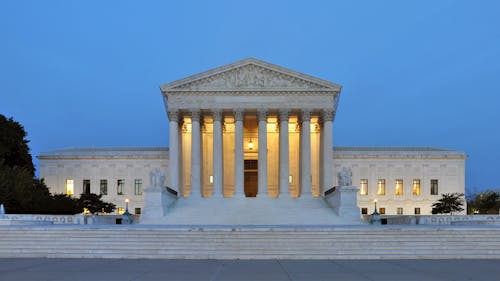U. community reflects on recent SCOTUS decisions about college admissions, LGBTQ+ protections

Last week, the U.S. Supreme Court made nine decisions regarding issues like election law, trademark infringement, freedom of speech and religion, loan forgiveness and affirmative action, among others.
Those pertaining to affirmative action, debt relief, and religious freedoms have drawn national debate and discourse, including statements from leaders such as President Joseph R. Biden Jr., U.S. Attorney General Merrick Garland, New Jersey Gov. Phil Murphy (D-N.J.) and Rutgers administration.
Students spoke to The Daily Targum about the Court's respective decisions for three high-profile cases: Students for Fair Admissions, Inc. v. President and Fellows of Harvard College, Biden v. Nebraska and 303 Creative LLC v. Elenis.
In the consolidated case pursued by Students for Fair Admissions, Inc., a nonprofit organization advocating for race-neutral college admissions procedures, the Court gauged the constitutionality of race-based affirmative action considerations in the college admissions process.
Affirmative action, which first gained traction in the U.S. during the late years of the Civil Rights Movement, encompasses policies designed to diversify employment and higher education. Its place in academia has been repeatedly litigated in the Supreme Court over the decades.
Cassandra Vega, a School of Arts and Sciences senior, said affirmative action served as an acknowledgment of the struggles endured by marginalized communities at the hands of the American government and society.
"Affirmative action matters because it validates the experiences that Black, Latinx and Indigenous people have endured in this country for centuries," she said. "This was supposed to be the first step toward healing those relationships and making a more equitable America."
The Court ruled that affirmative action programs are unlawful under the Equal Protection clause of the Fourteenth Amendment to the U.S. Constitution.
Vega said the effects of slavery and historical discrimination against Black and Latinx American communities are still impactful today. Yet, the general American populace falsely believes the country has made significant progress and that it can move past the importance of looking at race in education, she said.
"(The decision) demonstrates what I think a lot of us have always known, which is that the system does not care for us (and) does not care to protect us," Vega said. "And it's very disheartening because, at the end of the day, especially people that are part of these communities, know that diversity does not come altruistically."
Vega and Sarah Samdani, a School of Arts and Sciences senior, also spoke about the hypocrisy associated with the Court's claims of colorblindness given the existence of legacy admissions, admissions based on an applicant's family history at certain academic institutions.
Maintaining legacy admissions while striking down affirmative actions takes away the one tool which could neutralize an otherwise unequal admissions process, Samdani said. Vega said such a decision also undercuts the idea that admissions should be based on merit.
"Legacy admissions and maintaining them quite literally say, 'It actually doesn't matter, the character that you have, or the things that you've done,'" she said. "'We are not judging you holistically as a person. We are judging you based on who your parents are and how much money they've donated to the school.'"
Both Samdani and Vega spoke about alternatives to affirmative action in the wake of the recent decision.
Samdani said alternatives to affirmative action have previously fallen short of replacing the benefits of having such policies in place. With the recent decision, schools may find it more challenging to promote diversity on campuses but should continue to do so.
Vega said some ways for campuses to encourage inclusion include promoting existing diversity programs and Historically Black Colleges and Universities (HBCUs). At Rutgers, she said requiring students to take courses focused on marginalized communities' social issues and experiences is invaluable to their education and demonstrates Rutgers' commitment to equity.
University President Jonathan Holloway released a statement to the Rutgers community in response to the Court's decision in the case, reaffirming the University's commitment to diversity and stating that the University's admissions policy would be evaluated in accordance with the new precedent.
John J. Farmer Jr., director of the Eagleton Institute of Politics, also remarked on the future of admissions at the University, saying the decision may pose a new occasion for universities like Rutgers to improve how they incorporate social determinants of success into their admissions policies.
The ruling issued in Biden v. Nebraska also pertained to higher education, overturning President Joseph R. Biden's loan forgiveness program initially enacted in response to the pandemic.
Chloe Smith, a School of Environmental and Biological Sciences senior, said the Court's decision makes it harder for people who have already dealt with hardships to obtain academic opportunities.
Paying off debt after graduation can require immense sacrifice, especially for people of color, she said.
"So I'm Black," Smith said. "I'm African American, and a lot of people who look like me, their chances of getting into college have just been sliced in half, especially if they come from a lower socioeconomic neighborhood or community. (The Court) is making it so challenging to get into college or higher education. And then if they do get there, (they) have to be $200,000 in debt when (they) come out."
The loss of an equitable and prosperous future emerged as a recurring theme in these students' reflections on the Court's recent rulings, including the one issued in 303 Creative LLC v. Elenis.
In this case, the Court ruled public accommodations laws, defined as anti-discrimination laws which apply to services provided to the general public, are not unconstitutional. But, businesses cannot be forced to create art that goes against their values on the grounds of free speech.
Alice Ko, a School of Arts and Sciences sophomore, said the Court's decision was worrying and raised concerns about the well-being and success of queer Americans.
"The recent ruling in (303 Creative LLC v. Elenis) paints a terrifying future for the LGBTQ+ community— one in which their right to live freely as Americans can be turned away by anyone who simply does not wish to serve them," Ko said. "The ability for any business owner providing a public service to deny those services to a protected class is both unconstitutional and un-American."
She also critiqued the role of politics and money in the Court's recent decision-making. While she said she believes that politics have a place in lawmaking, it should not be the grounds for decision-making at the Supreme Court.
"(Though) the personal does not escape the political, the highest Court in the nation has a greater duty to separate those two ideas so the personal is protected and the political cannot surpass it," Ko said.



